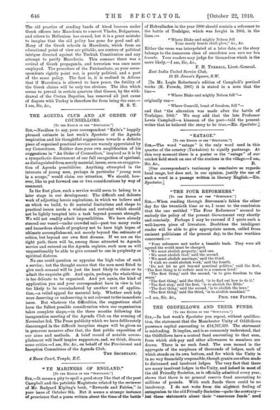4 ' YE MARINERS OF ENGLAND."
[To TEE EDITOR Or THE " SPECTATOR."]
SIR,—It seems a pity to spoil a good story like that of the poet Campbell and the patriotic Magistrate related by the reviewer of Mr. Rudyard Kipling's book, "Rewards and Fairies," in your issue of October 8th. But it seems a- strange instance of prescience that a poem written about the time of the battle of Hohenlinden inthe year 1800 should contain a reference to the battle of Trafalgar, which -was fought in 1805, in the lines •
". Where Blake and mighty Nelson fell Your manly hearts shall glow," &c., &c.
Either the verse was interpolated at a later date, or the story belongs to the numerous class of anecdotes non vero ma ben, trovato. Your readers may judge for themselves which is the more likely.—I am, Sir, &c., F. H. TYRRELL, Lieut.-General. East India United Service Club, 16 St. Tames's Square, S. W.
[In Mr. Logic Robertson's edition of Campbell's poetical -works (H. Frowde, 1907) it is stated in a note that the line- " Where Blake and mighty Nelson fell "— originally ran-7- "Where Granvill, boast of freedom, fell "- and that "the alteration was made after the battle of Trafalgar, 1805." We may add that the .late Professor
Lewis Campbell—a kinsman of the poet—told the present writer that be believed the story to be true.—En. Spectator.];














































 Previous page
Previous page